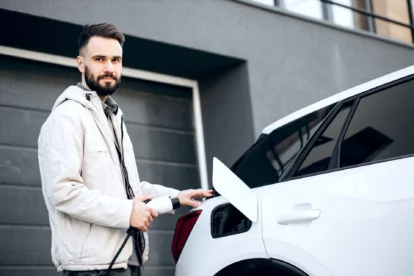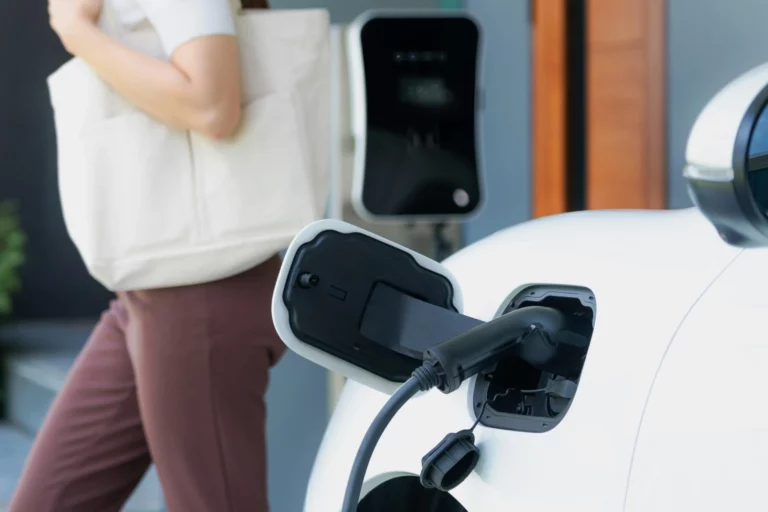Where to install a home eletric vehicle charger?

14th February 2023

If you drive an electric vehicle (EV) or have one arriving soon, you might be wondering if you need an a chargepoint for your car at home.
As chargepoint installers, it’s a question we get asked more than you think. That’s why we’ve produced this unbiased article to help you know if you really need a home car charger.
The short answer is most people will benefit from a home EV charger, but not everyone. Lots of factors influence how suitable a domestic charger is, the main reasons being how many miles you drive, the alternatives to home charging and the difficulty of the installation.
We’ll take you through the factors that can help you decide if you need a home EV, the types of charging available and who home charging is good for.
Here are some of the things you should consider when thinking about a home chargepoint:
Home EV charging is the act of charging your electric vehicle at home. It’s the most popular form of charging. the RAC estimate 80% of vehicle charging is done at home.
The charge points are units roughly the size of a shoebox connected to your mains electricity. There are two options for most charge points, a tethered or untethered charging cable (detachable or unattachable) connected to the unit itself.
The charger plugs into the car is powered by your electricity coming into the unit from your mains electricty.
Most chargers are ‘smart’ chargers which means they’re connected to the internet. This means you can connect a charger to your phone to schedule charging, track the battery charge level and see exactly how much electricity you’re using to charge your vehicle.
There are 3 home charger sizes – 3.6 kW, 7 kW chargers and 22 kW chargers available. with 7 kW being the most popular choice. A 7 kW charger will charge a 62 kW battery by 80% in just over 7 hours, which makes overnight charging practical.
A 22 kW charger requires a three phase electrical supply which very few households have available. 3 phase upgrades are a possibility but they’re usually disruptive and costly.
Home charging is typically the cheapest charging method too, as you’re using your own electricity and not paying for a service which is the case for public charging.
Broadly there are 5 main ‘types’ of charging :
You can charge your EV by plugging a lead, an Electric Vehicle Supply Equipment (EVSE) cable into a normal UK socket which will supply up to 3 kW. Standard 3 pin charging is more of a last resort due to the slow speed.
EVSE charging is extremely slow, to charge a 62 kW battery up by 30% (at 2 kW) would take 9.3 hours.
Additionally, standard EVSE cables normally aren’t very long, so they often require an extension lead. You must ensure any extension lead is rated at 13 Amps or higher otherwise it is unsafe to use for vehicle charging.
https://topcharger.co.uk/using-a-3-pin-plug-to-charge-at-home/ Provide lots more information about 3 pin charging.
Arguably the biggest factor in choosing to install a home charger is how many miles you’ll be driving your EV. If you’re driving lots of miles, you’ll need to charge your car’s battery more often.
If you’re charging more frequently you have to consider convenience and the cost of charging. Having a home charger allows you to charge overnight which is cheaper and easier as smart chargers allow you to schedule exactly when you want you car to charge.
Home charging is cheaper than using public chargers, as this data from The Energy Saving Trust shows.
| Location | Cost |
|---|---|
| Charging the battery at home for 10,000 miles per year | £523.18 |
| Charging the battery at a public charge point for 10,000 miles per year | £1,297.78 |
| Charging 70% of the time at home and 30% at a public charge point | £755.55 |
| Annual fuel cost for petrol Nissan Micra | £1,554.64 |
Public charge points cost over twice the price of home charging as companies have to cover the installation cost, insurances, electricity and include a profit margin on each charge.
NimbleFins say the typical battery size is 62 kilowatts (kW) and the typical real-life range is 212 miles.
To charge a typical EV battery by 80% with a 7kW charger it’ll take 7.15 hours, so charging overnight at home is the easiest and most convenient time for most EV drivers – unless you can charge your car whilst at work.
To charge a standard EV up from 20% to 100% charge at home with a 7 kW charger it’ll cost £17.01 using March 2023’s electricity price in the East Midlands.
The ease of charging is something you should consider when deciding how you’ll charge your EV.
For most people, charging at home is the easiest way to charge if you have off street parking. Charging overnight when you don’t need to use your EV is cheaper if you have a ‘time of use’ energy tariff, meaning it’s often the most effective time to charge.
If you live nearby to public charger, especially if it’s a superfast charger you can charge your car whilst you have a coffee – however you’ll pay a premium for the faster chargers in car parks.
It’s important to consider how much it will cost to install an EV charger at home, the conventional wisdom on the internet suggests anywhere between £800-1500. Our data shows typical costs are usually in the £1000-1200 range.
Where you live is an important factor in deciding whether it’s worth getting a home EV chargepoint. Houses with off-road parking are usually the easiest charger installations as there is enough space and you can reliably park close enough to the charger.
If you live in an apartment or flat, or somewhere without off-road parking EV charging installations are often more difficult. It’s still worth getting an EV charger installed if your landlord or managing agent is open to the idea.
There is a government grant available for landlords https://www.gov.uk/electric-vehicle-chargepoint-grant-landlords
If you can’t reliably park your EV in the same spot near your home, installing an EV charger might not be worth it. We wouldn’t recommend going through the install process if it won;t provide you with greater convenience and a return on your investment.
If you’re a homeowner with off-street parking and you drive a reasonable amount of miles, or drive long journeys, then a home EV charger is worth it in the vast majority of cases.
Charging elsewhere (unless at work) is more expensive and more inconvenient, so having the ability to reliably charge at home makes sense for you.
If you don’t drive very often, or cover a lot of miles, a home EV charger might not be necessary if you’re willing to charge at work or use a public charger.
Additionally, if you live in a flat or somewhere without off-street parking then the cost or inconvenience of having a charger fitted might be too great.
Need help with your EV Charger installation? Contact us today